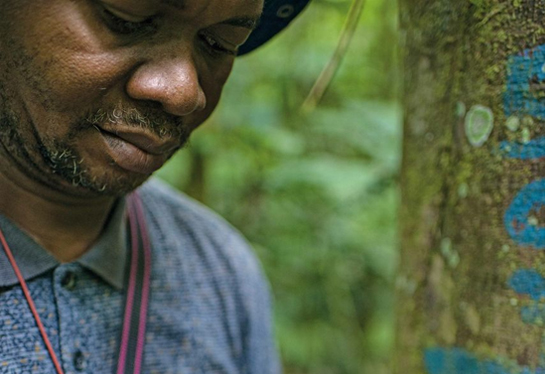
Center for International Forestry Research

Young researchers leading the way for forestry in the Congo
Deep in the Yoko Forest Reserve, across the Congo River from Kisangani in the Democratic Republic of Congo, Consolate Kaswera Kyamakya is checking her traps.
She’s been lucky – lying in the leaf litter is a small, striped creature known as an elephant shrew, prized by villagers in this area for food.
We have here in the DRC the majority of Africa’s tropical forest, so if we do not train the young people, who will manage these forests later?
Professor Leopold Ndjele
Coordinator, REFORCO
But Kyamakya is no hunter. She’s a scientist about to complete her PhD at the University of Kisangani. Her research aims to discover the threats to the two local species of elephant shrews and the impact of human activities on their distribution, by comparing the populations of the animals inside the reserve with those outside.
“The number of farmers, hunters, and trappers is really on the rise. And as the big prey gets rarer, local people rely on small animals like this one for food,” she said. “So our work has suggested that there is a need to raise the awareness of the local community about the pressure their activities place on the shrews . . . If we do nothing about it, we risk the extinction of this population.”
Kyamakya is one of 25 Congolese PhD students enrolled in a special forestry research capacity building program at the University of Kisangani.
The REFORCO (Congo Forestry Research) project, funded by the European Union and implemented by CIFOR along with several other partner institutions, aims to train a new generation of researchers like Kyamakya.
“We have here in the DRC the majority of Africa’s tropical forest, so if we do not train the young people, who will manage these forests later?” says Professor Leopold Ndjele, the coordinator of the REFORCO program in Kisangani.
It is not just PhD students who are supported by REFORCO: the project also funds the Master of Forestry program at the University of Kisangani. Thirty-five students have already graduated, with 18 more currently in training.
“These youth[s] will, after their training, work within the university and succeed the current teachers. We are . . . training the future conservationists of nature, people who will help the population to fight against malnutrition, poverty and above all to achieve sustainable management of the forests,” Ndjele said.
Prosper Sabongo is another PhD student in the programme. He is analysing the composition of a particular type of forest ecosystem near Kisangani.
“This kind of forest is dominant in the Central Congo Basin so it is important to know about its dynamic,” said Sabongo. He describes how the huge trees in this forest store carbon, keeping it out of the atmosphere and slowing global warming – meaning the Congo Basin is important not just for the DRC, but for everyone.
Said Sabongo, “We talk today about climate change. While the forest is intact, it can compensate for the harmful environmental effects that humans are producing . . . Therefore we shall not forget or ignore his forest, given the current realities that humanity is experiencing.”
Watch our video “Young Leaders” at cifor.org/youngleaders
